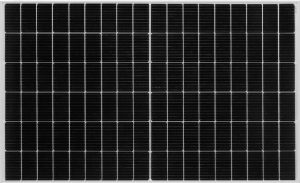
Chinese module manufacturer JinkoSolar has launched a new solar module for distributed generation projects.
The Tiger Pro 54HC panel is available in five versions with power ratings ranging from 395 to 415 W, and efficiency ranging from 20.28% to 21.3%.
The new product is made with 108 high-efficiency, half-cut monocrystalline cells and features a maximum system voltage of 1,500 V.
The open-circuit voltage is between 36.9 V and 37.31 V and the short-circuit current ranges from 13.71 A to 14.01 A. All five versions of the module measure 1,718×1,134×30mm and weigh 22kg.
The panel can be used with operating temperatures ranging from -40 degrees Celsius to 85 degrees Celsius and their operating temperature coefficient is -0.35% per degree Celsius.
It is enclosed between 3.2mm high transparency, tempered glass surfaces, and also features a junction box with an IP 68 rating. The manufacturer offers a 25-year linear power output guarantee and a 15-year product guarantee.
“Suitable for a variety of distributed energy resources (DER), the new Tiger Pro modules feature a redesign in terms of size and weight, two of the most important features to fit the height and arm-length of installers, which are also user-friendly for rooftop installation,” Jinko said in a statement.
The manufacturer also stated that the module provides remarkable mechanical load safety and reliability under extreme weather conditions, which should make it suitable for installation in high snow or high wind load areas. “The Tiger Pro modules continue to meet the needs of most residential customers with [their] small size and elegant appearance, and [are] expected to become the best choice for high-efficiency PV modules in the residential market,” the company explained.






